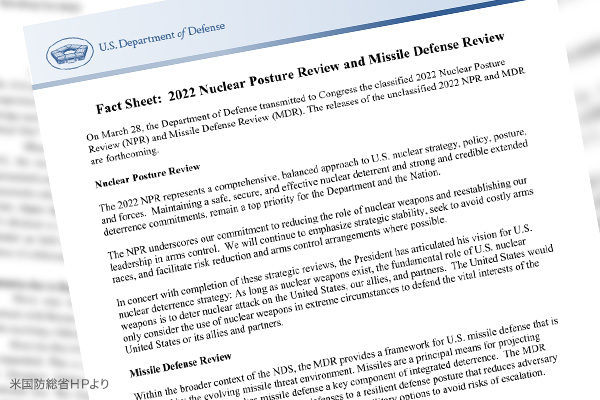As Russia has threatened to use nuclear weapons since its aggression against Ukraine, insecurity in Japan about nuclear attacks has led to growing calls for “nuclear sharing” with the United States or Japan’s possession of nuclear weapons on its own. The U.S. administration under President Joe Biden is partially responsible for such insecurity.
First, on responses to Russia’s potential aggression against Ukraine, the Biden administration before the actual aggression promptly denied the use of force. The administration should have left responses vague to keep Russia hesitant about the aggression. The denial allowed Russia to invade Ukraine without fearing U.S. armed intervention. Second, the Biden administration has also flinched in the face of repeated Russian nuclear intimidation, leaving Russia to take the initiative in escalating the war in Ukraine. Biden’s weakness has been observed by U.S. allies.
Submarine-launched nuclear Tomahawk project abandoned
Third, while the Biden administration in its fact sheet on the Nuclear Posture Review in late March said maintaining “strong and credible extended deterrence commitments” remained a top priority, its budget proposal published almost simultaneously failed to include outlays for a project to develop submarine-launched nuclear Tomahawk cruise missiles that had been initiated by the former Trump administration. Submarine-launched nuclear Tomahawks would feature stealth and flexibility and become the most effective tool for providing extended nuclear deterrence to U.S. allies. Nevertheless, the Biden administration abandoned the project, prompting observers to doubt if President Biden is serious about providing U.S. allies with extended nuclear deterrence.
This means that what the Biden administration says differs from what it does. The decision to abandon the submarine-launched nuclear Tomahawk project apparently have come from a partisan consideration that it is a Trump project, rather than from a judgement based on the international strategic environment. I regret the decision.
Regular ICBM testing postponed
Fourth, while previous U.S. administrations have regularly test-fired Minuteman III intercontinental ballistic missiles, the Biden administration postponed such test scheduled for March amid Russia’s aggression against Ukraine for the reason of refraining from giving misunderstanding to Russia.
The Obama administration, another Democrat regime, also postponed a Minuteman III test in 2013 when a North Korean nuclear explosion test triggered a crisis on the Korean Peninsula. In contrast, the Republican Trump administration increased U.S. missile-firing tests in 2017 when North Korea conducted a series of ballistic missile tests.
Russia, North Korea and China will become more offensive, interpreting the abovementioned U.S. attitude as indicating weakness. Regarding nuclear deterrence, we should remember that climbing an escalation ladder can eventually minimize the possibility of enemy’s use of nuclear weapons.
Fumio Ota is a Councilor and a Planning Committee member at the Japan Institute for National Fundamentals. He is a retired Vice Admiral of Japan Maritime Self-Defense Force.


